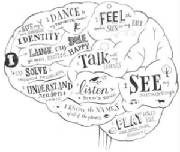|
Stress and Disease
- We are only interested in our health when we lose it.
- The connection between the body and the mind - psychosomatic relationship - is key to taking care of!
Psychosomatic Disease (Merck Manual)
- Ill health due to emotionalism, poor coping and chronic distress
- Emotional states involved:
Dubos, 1965: also a connection with infection
- microbes are always present ... our response to them is what is the key
- we respond poorly when we are under stress
How does stress act as a catalyst for organic disease?
- allows the disease to start in the body
- encourages a more rapid spread of the disease than ordinarily expected
Key point is in the lowering of the capabilities of the body's immune system
What to do to eliminate stress?
Try a holistic approach that allows
the intervention to stress to be directed at several levels simultaneously:
- Physical
- Emotional
- Mental
- Spiritual
Dusek, 1996:
- beliefs and thoughts = mental foundation of our world
- form and behavior = physical counterpart of our thoughts
- spiritual awareness = how tuned in we are to spirit energy
- emotional filter - governs how closely we can approach the
above three elements
The main point is that since
we sometimes hold beliefs, have feelings or use behaviors which are no longer appropriate, we have to deal with the combination
of these things when we attempt to improve our lives.

Stress operates in many dimensions, so attempting to contain
it is like carrying bottles ... you need to have a hold of each one, or you need to arrange them so that one supports another.
|
 |
|
Disorders Of Arousal
Stress arousal
can be created in conjunction with many different environmental stimuli; therefore too much stress
arousal equals "disorders of arousal," e.g. anxiety symptoms presenting as either psychological disorder or gastrointestinal pain.
In understanding the mind/body connection with arousal
disorders it is important to know the regions of the brain that connect with anxiety.
- limbic center: anxiety/personality disorders (Pert, 1995)
- hypothalamic center: sensory stimulation
- reticular activation center: nervous system hyperactivity

When life events happen -> there is a conscious interpretation of the event
then emotional integration happens - we make a subconscious appraisal or judgment of the event or the way the event
is playing out - then comes -> arousal -> which mean organ activation or the brain gets involved -> then
you have the choice of competent coping +/- incompetent coping.
The limbic or hypothalamic
systems when aroused can be involved in psychosomatic disease?
The subconscious appraisal
(judgment) pathway: receives stimulation -> causing one to have a feeling, a memory, or a reactive predisposition.
After this happens there is either a preparation for action (i.e. any action)
or no thinking at all.
The voluntary pathway of
all of this information concerning the event that is happening:
- You can voluntarily perception make a judgment of the situation.
- You could make this evaluation and use the decision making
skills that are influenced by:
- self
- ego strength
- value system
- heredity experience
is involved through the action of psychological defenses (we will do what we usually do and what we think will work without making us look bad or feel
the least amount of pain)
Our actions can be varied
due to our interpretation of the expected consequences.
There is also background
action going on in your body:
- the body is like a multitasking computer which does things
in the background while most of the processing power is devoted to the one task in the foreground (e.g.,
background response to a stressful situation could involve a number of adjustments of which we are not aware)
- e.g. tensing muscles
- increased heart rate
- increased sweating
- tendency to strike out against others
... main idea is in terms of the "tone" of the individual or
what your temperament usually involves:
- highly toned person has been "trained" to be stressed in conjunction
with all sorts of events (e.g. through childhood abuse where the event is forgotten but
the triggers still work)
so that
- end result is that we often feel stressed but we don't know
why we should feel stressed
When it comes to the time when we have to integrate our emotions
with our thoughts (i.e., consciously interpret the stress arousal) ...
this could lead to:
- more stress if there is a fear of failure
- more stress if there is an attack in our plan
- more stress if a planned attack must be abandoned
- less stress if we can find an elegant way out of the situation
Since prolonged
physical arousal is often not perceived, it can lead to chronic problems (e.g. back pain). Stress arousal can be suspected
if we have some (or all?) of the following symptoms:
- moodiness
- irritability
- depression
- anxiety
- withdrawal
- drug/alcohol abuse
- hostility
- coping
is an attempt to neutralize stress arousal - Meaning if you're
not feeling well, you don't realize that you're too stressed - you might begin to act out in:
- e.g. poor behaviors (that
will eventually end up hurting you more)
- physiological reactions (body
aches, headaches, restlessness in the body)
- cognitions (thoughts about
what might happen)
- perceptions (different thoughts
about the state of your situation)
- motor acts (punching something,
kicking something, hitting head against something)
You must make a choice according to what you know how to do
between:
- competent coping = health improving coping
- incompetent coping = sacrifice of health
Bradshaw, 1990:
Most likely you don't know how to cope in healthy productive
manner so your mind recruits you to use the following negative or incompetent coping mechanisms:
- conversion - eating, drinking, etc. in response to stress
- denial - refusal to accept that things are happening
- dissociation - forgetting or misperceiving what did happen
- minimizing - making things look not so bad projection -
- ascribing to others your own thoughts/behaviors repression
-
- removing from conscious memory withdrawal
|
 |
 |
 |
|
|
 |
 |
 |
|
|
|

